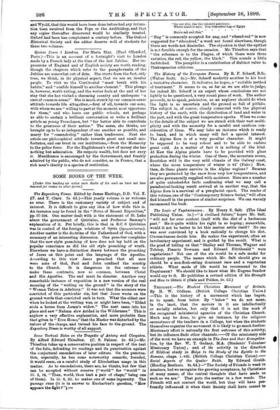SOME BOOKS OF THE WEEK.
[Under this heading we notice such Books of the week as have not been reserved for review in other forms.]
The Expository Times. Edited by James Hastings, D.D. Vol. X. (T. and T. Clark. 7s. 0d.)--This yearly volume is as welcome as ever. There is the customary variety of subject and of interest. It is difficult to give any idea of how wide this is. An instance may be found in the "Notes of Recent Exposition," pp. 97-104. One matter dealt with is the statement of St. Luke about the government of Qnirinius, and Professor Ramsay's explanation of it. Put briefly, this is that in B.C. 6 Quirinius was in control of the foreign relations of Syria (iryciAoyeUovros). Another matter is the doctrine of the Fatherhood of God, with a summary of an interesting discussion. One preacher complains that the new style preaching of love does not lay hold on the popular conscience as did the old style preaching of wrath. Elsewhere we have a distinction drawn between the preaching of Jesus on this point and the language of the Apostles. According to this view Jesus preached that all men were sons of God, Paul and John confined the sonship to the Church. It is dangerous in the extreme to make these contrasts, now so common, between Christ and His Apostles. The end must be disaster. Another very remarkable instance of exposition is a new version of the real meaning of the "writing on the ground" in the story of the " Woman Taken in Adultery." It was not that the accusers were convicted of this particular sin, but that Jesus wrote on the ground words that convicted each in turn. What the eldest saw when he looked at the writing was, or might have been, " Eldad stole a house from Joram's widow." The next came into his place and saw " Nahum slew Aridad in the Wilderness." This is anyhow a very effective explanation, and more probable than that given in "Ecce Homo," that the Master was disturbed by the nature of the charge, and turned his face to the ground. The Expository Times is worthy of all support.


































 Previous page
Previous page